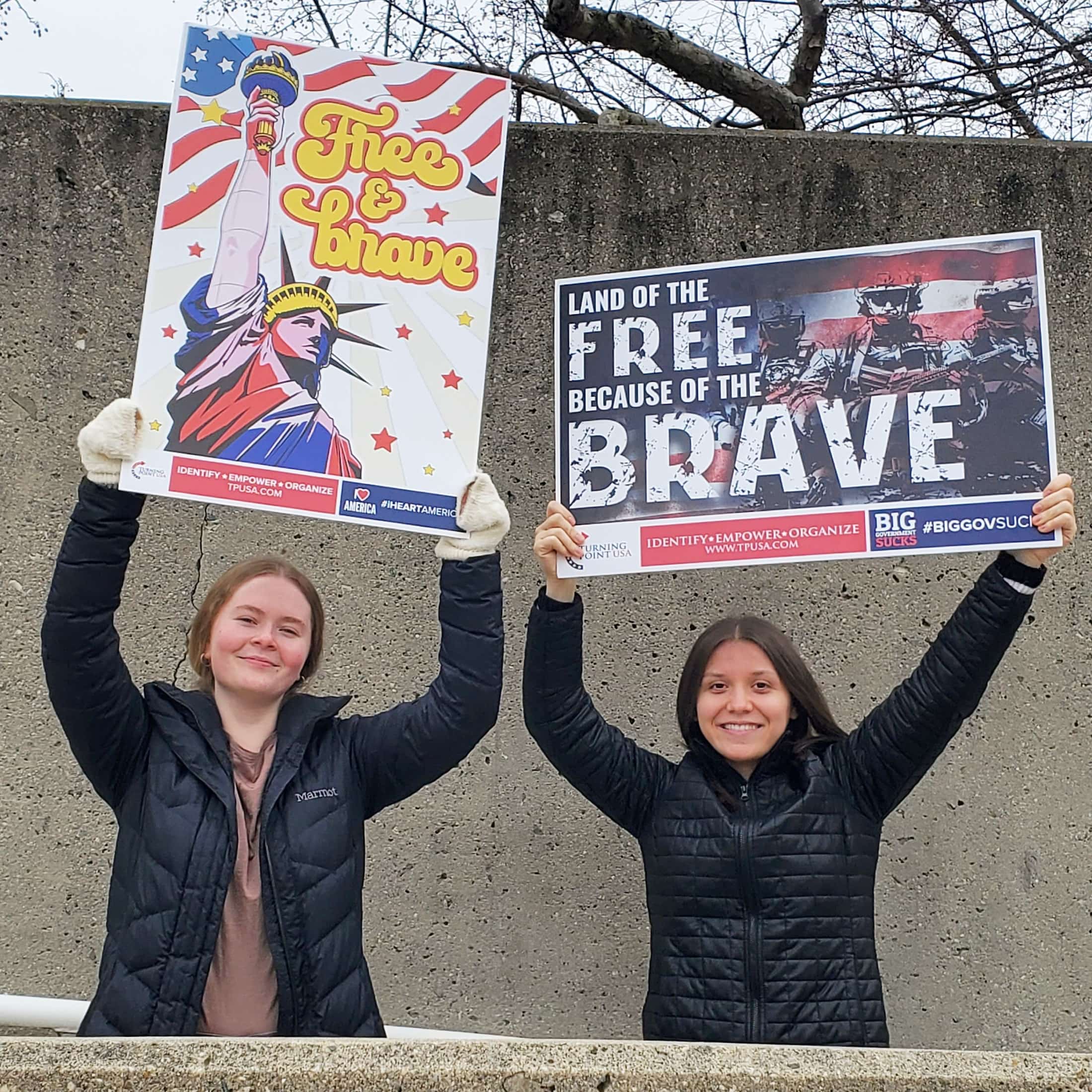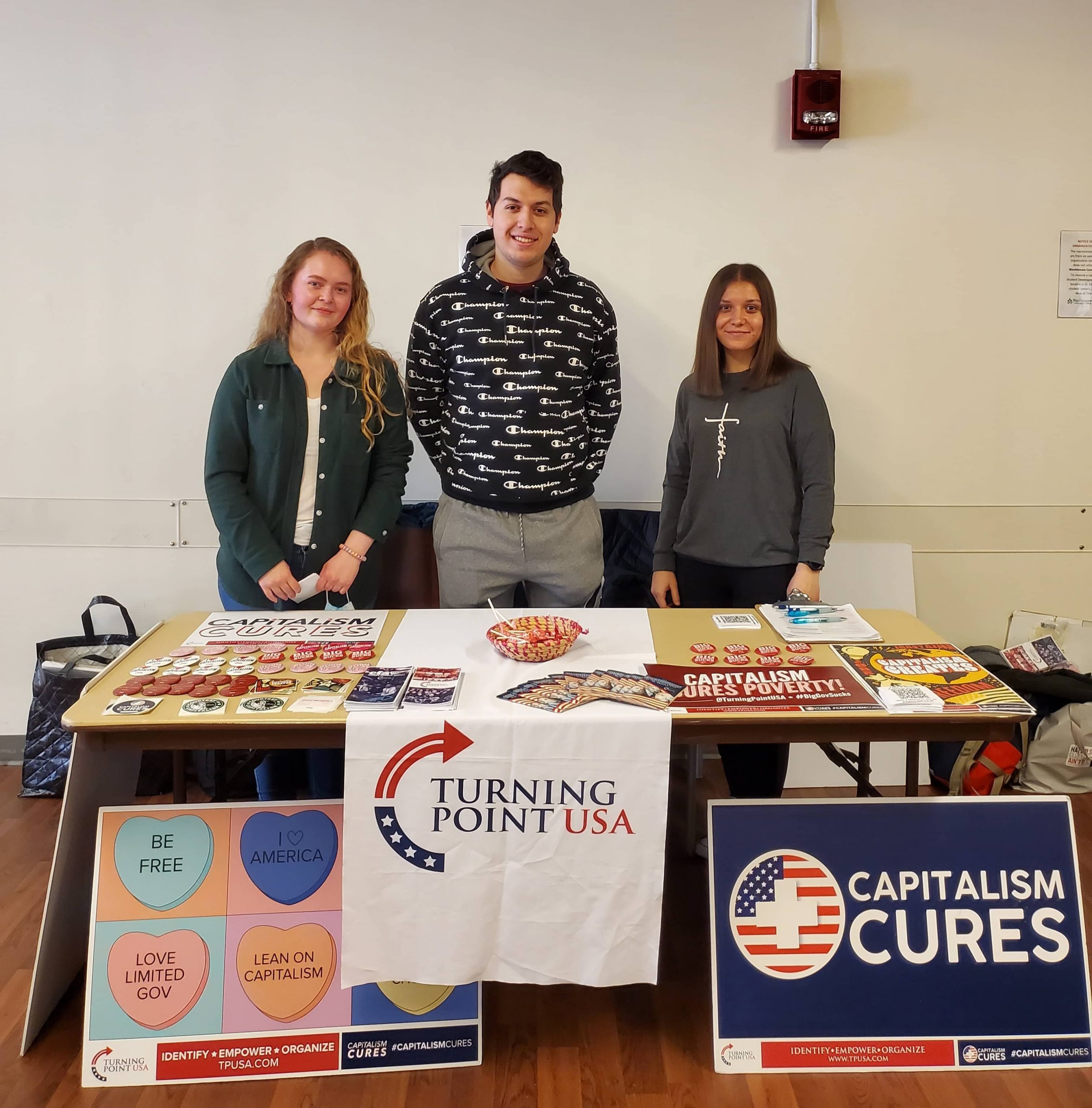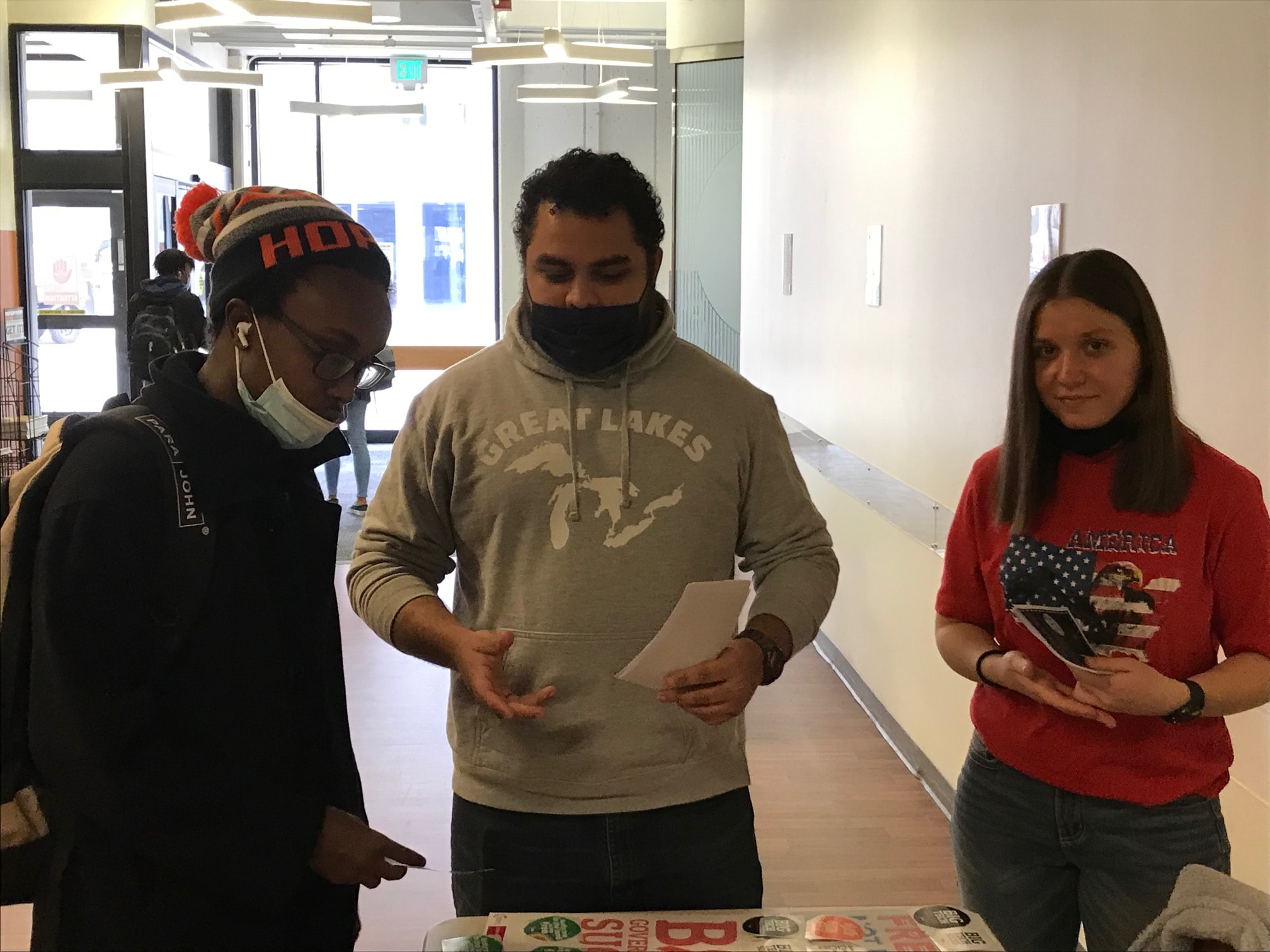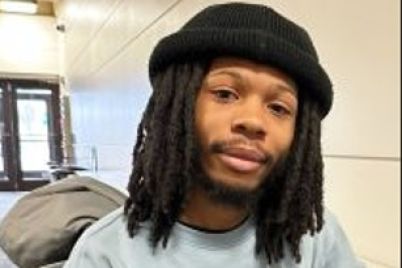
WCC Turning Point USA officers Sophia Tomlinson, left, and Sandy Blindu, right, hold signs displaying the youth organizations slogans. Courtesy of Sandy Blindu
by JORDAN SCENNA
Deputy Editor
Inside room 128 on the first floor of the Liberal Arts and Science Building, popcorn is being made. Two students, Sandy Blindu and Sophia Tomlinson struggle with the small, red popper that Tomlinson brought from home. They laugh as they fiddle with the contraption, determined to figure out how the machine works.
It’s movie night for the newly formed Turning Point USA club on the campus of Washtenaw Community College, and officers Tomlinson and Blindu are preparing the traditional treat for whoever wants to take part.
“We have seven members so far,” said Blindu, the club’s president. “Three signed up through Campus Connect but they haven’t shown up to any meetings yet.”
After scrapping the movie, “The Patriot,” for its long runtime, Blindu decides on “White House Down,” a 2013 film about a terrorist attack on the White House.
Blindu’s interest to form a WCC chapter of Turning Point peaked after attending a lecture by Charlie Kirk, the organization’s founder, last October. The group’s stated mission is to educate students about the importance of fiscal responsibility, limited government, free markets, and individual liberty.
The speech, followed by a Q&A, was part of Kirk’s “Critical Racism Theory” tour that visited the University of Michigan. The event galvanized Blindu, who was unsure about starting the club. She was impressed by the questions from students and it motivated her to start a chapter at WCC.
Turning Point USA is classified as a non-profit organization and boasts its presence on 3,000 college campuses nationwide.
According to the Turning Point website, it’s the “fastest growing youth organization in the country.” In 2019, TPUSA received over 28 million dollars from contributions and fundraising.

Sophia Tomlinson, left, David Blindu, center, and Sandy Blindu work the TPUSA table every Wednesday in the student center. The group offers buttons, stickers, and posters for students. Jordan Scenna | Washtenaw Voice
Free speech is a keystone for the WCC group, which points to a threat against freedom of speech as one of its main concerns. They’ve seen a trending narrative that the first amendment only applies to speech that is “likable.”
“You know, you look at a lot of other countries, and unfortunately, you see it coming into the U.S. more and more (censorship),” Tomlinson said. “I think one of the greatest things about the U.S. is free speech. Free speech is free speech, whether you like it or not, and that should be advocated for on campuses.”
Tomlinson cites former president Donald Trump’s Twitter ban as an example of this type of censorship.
“You look at Twitter and our 45th president being censored. I think it has a lot to do with social media platforms, but I see it more and more on college campuses. As long as they like what you’re saying then it’s considered free speech. If they don’t, then you’re labeled as something or you’re not allowed to say it because it doesn’t fit their opinion.”
While banning Trump might have been a sticky precedent to set, it’s hard to argue its legality. The First Amendment protects against government censorship, not against decisions made by private companies.
In an interview with the The New York Times in January 2021, University of Utah law professor RonNell Anderson Jones said,
“It is certainly possible to violate the values embodied in the First Amendment without violating the First Amendment itself. But the basic legal question could hardly be more straightforward.
It’s become popular—to label all matters restricting anyone’s speech as a ‘First Amendment issue,’ but the First Amendment only limits government actors, and a social media company is not the government.”.
Tomlinson agrees that, as a private company, Twitter should be able to ban whoever it wants, if the terms of service were violated.
In a Jan 8, 2021 blog post, Twitter cites a breach in their terms of service as the reason they perma-banned Trump. Specifically, they point to a rule against the incitement of violence.
Socialism and the culture war
Every Wednesday from 11 a.m.-1 p.m. the group tables in the Student Center to discuss topics like Second Amendment rights and economic policy. A battle for America’s soul wages, and all students are welcome to come and draw their swords.
Blindu and Tomlinson have seen evidence of an increase in students who identify as socialist.
“We’ve been handing out surveys discussing political ideologies on campus, and we can see what they identify as politically, and I’ve seen socialist ones,” Tomlinson said. “For the majority, it’s usually liberal or conservative, but you can see what other schools have put in there too, and it’s a ton of socialist ideals.”

Chris Gaffrey, center, and Sandy Blindu speak to a WCC student. Gaffrey is the Motor Territory Senior Field Representative for Lower Eastern Michigan. Jordan Scenna | Washtenaw Voice
Socialism is a menace to the American free market economy, according to the Turning Point group. It points to politicians like Bernie Sanders and Alexandria Ocasio-Cortez promoting socialistic policies and fueling the culture war, a war that Turning Point is hell-bent on winning.
Chris Gaffrey, a TPUSA senior field rep., defines the “culture war” as a “shaming” of opinions that might be unpopular. In an email, Gaffrey said,
“The ‘culture war’ is referring to the fact that most young people in America are happy to and quick to shame someone for believing in limited government, free speech, the second amendment, etc., without ever hearing their actual reasoning for their beliefs. That is cultural, and something that we hope to change so that students, although they may disagree, will still respect the rights of others to have a voice on and off campus.”
Tomlinson focuses on economic policy.
“I think when we talk about a culture war, they’re trying to shift the culture in America from a capitalist free market economy to a socialist one.”
Asked how a socialistic approach might benefit the U.S. healthcare system, Tomlinson talked about the need for reform, but without using socialism to address the issues.
“I definitely think America needs to take a look at its healthcare system, but I don’t think having a socialist perspective on healthcare is a good idea,” she said.
She shared similar views on the high price of college. While it’s an individual’s choice to continue their education, the cost needs to be lower, Tomlinson said.
“You look at some people, when they get out of college, they’re not even making enough to pay back their student-loan debt. If you could bring the cost down, more people would go to college and societies that are more educated would do better.”
Tomlinson doesn’t have a plan on how to lower education costs but thinks “universities could probably just lower the cost and do just fine.”
Turning Point’s presence puts LGBTQ+ community on alert
Outspace is a student-organized gender and sexuality alliance at WCC. The group promotes inclusivity for all students on campus, with a focus on expanding awareness to those at the margins of the LGBTQ+ community.
David Marshall, a computer science major and member of Outspace, has voiced safety issues concerning the presence of Turning Point on campus.
The Turning Point website offers video-blogs on different cultural topics from a handful of contributors. Topics include cancel culture, vaccinations, education, and transgender issues. A vlog recorded by contributor Stephen Davis was of particular concern to Marshall. Entitled, “Transgenderism’s Constant Attack on Womanhood,” Davis gives his opinion on “what really constitutes being a woman,” and says that “transgenderism is tearing apart the very fabric of reality.”
Marshall says that the idea that how someone exists is an attack on someone else is ridiculous. Marshall expressed fear of such ideas turning into violence.
“You are automatically at a higher risk being a member of the queer community — that’s the world we live in. When people have a resentment for who you are, we’ve seen that resentment lead to violence.”
Gaffrey addressed the concerns by saying in an email, “TPUSA never advocates for violence and condemns those who do so.”
Marshall hopes the WCC Turning Point group has good intentions but remains cautious.
“It would be great if they’re just enthused about free markets and ‘America is neat,’ but it gives me a bad feeling,” he said.
Marshall also draws attention to the dangers of nationalism. “(Turning Point) has a ‘we are superior to you’ attitude, and we decide who the ‘we’ are.”
In an email response, Tomlinson said the WCC TPUSA chapter holds no resentment or hate toward any group or individuals on campus, and they don’t delve into social issues. Tomlinson wrote that the articles on the TPUSA website make no difference to what her chapter believes (limited government, free markets, individual liberties). The WCC chapter does not hold the same values as every other chapter.
She went on to say that the group encourages those who have different points of view to reach out for a conversation.
WCC TPUSA meets every other Tuesday from 2:30-4 p.m. in LA 128, and Wednesdays from 11 a.m.-1 p.m. in the Student Center.
You can contact Outspace on Campus Connect here.

